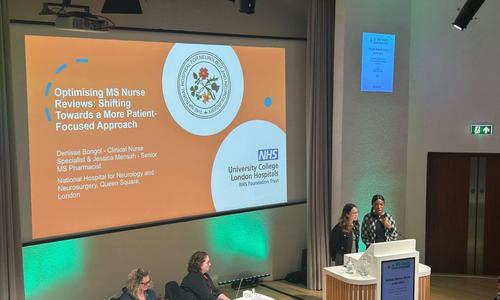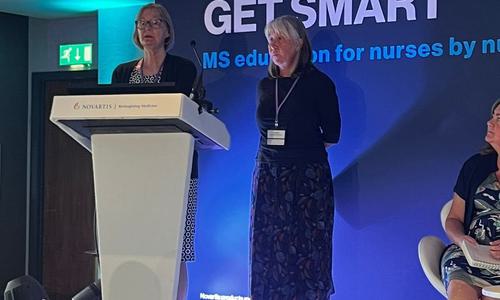International Nurses Day 2025: Our nurses. Our future. Caring for nurses strengthens economies
NewsOn 12th May, the global nursing community comes together to celebrate International Nurses Day – a moment to recognise the incredible work nurses do, to pause and reflect, and most importantly, to listen. This year’s theme, “Our Nurses. Our Future. Caring for nurses strengthens economies,” feels especially timely. Real lasting change in healthcare doesn’t start with assumptions or top-down reform, but by engaging nurses in shaping the future of healthcare.
In the UK, this message is particularly urgent. The health system is under immense pressure, and nurses are carrying much of that weight. With a projected shortage of 10,000 nurses in the NHS in 2025 (Royal College of Nursing, 2024), we face a clear and present challenge. But we also face an opportunity to rebuild, not just in response to the crisis, but in partnership with those who know the reality of care better than anyone: nurses themselves.

Today is also a crucial moment to highlight the growing concern around the shortage of nurses in neurology – a specialty often overlooked despite the rising burden of neurological disease. Many neurology services across the UK report challenges in recruitment and retention, with experienced nurses nearing retirement and limited succession planning in place (Thomas, 2024). A lack of visibility and clear career pathways in neurology nursing is also discouraging early-career nurses from entering the field. To address this, the Neurology Transformation plan offers a critical opportunity. By embedding clear career frameworks, promoting specialist training, and raising the profile of neurology nursing through leadership and mentorship initiatives, the plan can help attract, support and retain the next generation of nurses. Ensuring that neurology nursing is recognised as a dynamic, impactful and rewarding career choice is key to sustaining high-quality care for people with all neurological conditions.
Listening to the workforce: understanding the crisis
The challenges are complex and deeply rooted. But they are not unsolvable if nurses are brought into the conversation, and into the design of the solutions.
1. Declining student numbers
Nurses know why student numbers are falling. They see the barriers: the removal of bursaries, the rising cost of living, and the perception that nursing is undervalued. If we want to encourage more people into the profession, we must listen to those already in it and take action on the financial, emotional and systemic challenges they voice.
2. An aging workforce
Many experienced nurses are nearing retirement, especially in community and district roles. Their insight is critical. Before they leave, we must capture their knowledge, understand their needs, and involve them in mentoring and shaping the roles of future practitioners.
3. Growing demand and complexity of care
Nurses are telling us: the workload is growing, patients are more complex, and time is stretched thinner than ever. Services cannot evolve without the input of those delivering them. Effective transformation must be co-designed with nurses – only then will it be relevant, sustainable, and fit for purpose.
4. Burnout and moral injury
Perhaps the most urgent message from the workforce is this: nurses are exhausted. Compassion fatigue, burnout and moral injury are taking their toll. If we do not create space for nurses to speak openly about their experience – and act on what they say – we risk not only losing individuals, but the integrity of the entire system.
The human and systemic cost of not listening
The consequences of nurse shortages go far beyond the workforce:
Patients face longer waits and reduced access.
Remaining staff shoulder overwhelming workloads.
The quality and safety of care are at risk, especially in underserved areas.
Nurses have been raising the alarm for years. Now, they must be part of the solutions – not just consulted, but collaborated with. Their expertise is not just clinical; it’s strategic.
Building forward with nurses at the centre
There are clear and achievable steps that can help stabilise and strengthen the profession. But nurses must be involved in shaping and delivering them.
1. Invest in education and career pathways
Nurses know what attracts or deters people from the profession. Restoring financial support, promoting nursing as a modern, skilled career and offering clear development routes are essential. Nurses should be leading the conversations about how we recruit, train, and retain their future colleagues.
2. Retain staff through better working conditions
Safe staffing levels, manageable workloads and accessible mental health support cannot be optional. Listening to nurses about what makes them stay or leave must guide every retention strategy.
3. Embrace new models of care – designed with nurses
Innovations like community health teams and digital tools hold promise, but only if they work in real-world practice. Nurses must be at the centre of designing, testing and evaluating these models. Their insights are the difference between theory and success.
4. Honour experience with voice and influence
Too often, policy decisions are made about nurses without them. It’s time to reverse that. Nurses must be in leadership roles, at strategic tables and driving change alongside health system leaders and policymakers.
The Royal College of Nursing (RCN) continues to play a vital role in advocating for these changes, championing the profession and working to ensure that nurses’ voices are not only heard but acted upon.
Recent contributions like Anthony Lawton’s Fit to Care echo this message: that the future of nursing depends on systems that listen, value and respond to the lived realities of nurses.
Education as a platform for collaboration
At Neurology Academy, we recognise that education is about more than just sharing knowledge – it’s about connection, reflection and empowerment. Through our programmes, nurses are not only delegates; they become speakers, collaborators and leaders.
Nurses from our MS Academy MasterClasses recently had the unique opportunity to present their work at the ‘Get Smart’ and ‘At the Limits’ conferences. This opportunity to disseminate the projects they had undertaken within their workplace and discuss the impact on patient care and service provision is key to ensuring lasting change across the NHS. There was considerable interest from the audience both during the events and with new nurse delegates already signing for 2025.
Our newly launched education on multiple sclerosis for nurses working in Scotland highlights the interest and investment to improve care and support staff. Julie Dock, is part of the faculty for our new MS Nurse Academy Scotland and shared her story with us:
“My Mum was a nurse, and I grew up around the hospital. Listening to the stories of the ward, the care she provided and learning of disease processes stirred up in me a desire to follow this path. I wanted to be part of peoples journey to have an impact however small to enhance quality of life. Nursing is vitally important in helping to work together on treatment pathways and to make life in any way easier through compassionate and holistic care. I had worked with MS patients for some time but initially my neuro speciality was Parkinson’s disease.
When the opportunity arose for me to develop my MS speciality further, I grabbed the opportunity to support this growing community. My reason was due to a patient I came across in the community as a student nurse. She was in her twenties around the same age. She had advanced MS and required support for continence needs. I was mindful of respecting her dignity and supporting her emotionally as well as physically. I remember feeling what if that was me? How would I like to be supported? This patient always stuck with me and when I could then work in this speciality I wanted to give back what she had told me back then what was important to her. She expressed the need to maintain as much independence as possible, to have support from a caring team, and the trusting relationship she had built with her MS nurse.
These key things have been the foundation of how I support every individual. To truly listen to their needs and work closely to help them navigate the challenges they face with greater confidence and dignity. Advocating for every individual in which ever support they require, aiding in empowering them to make informed decisions, and provide both clinical and emotional support. It is personally fulfilling to be part of their journey, offering stability and encouragement, and contributing to their overall well-being. It truly is a privilege to be an MS specialist nurse.”
Find out more about the newly launched MS Nurse Academy Scotland here.

Parkinson's nurse Nick Bryden and his colleagues were shortlisted for the Nursing Times Awards 2023 for their Advanced MasterClass project “Improving timely medication access for people with Parkinson's in hospital through combined use of electronic records and education”.
This initiative, originally voted as the winning project by his MasterClass peers and faculty in 2022, went on to receive recognition in the Scottish Parliament and won the Parkinson’s Excellence Network Awards 2023. Nick continues to lead improvements in Parkinson’s care, inspiring services across the NHS.
“The Parkinson’s Academy (Neurology Academy) has helped me on many levels, the MasterClasses are not just learning but also developing your network of support. Their encouragement and constant support to build up my confidence in myself has allowed our project to developed further but also influenced national policies. I know I can email, pick up the phone and they are always there for advice.”
A recent in-depth review of Parkinson’s nurse specialists has also shed important light on the critical role they play – not only in supporting people with Parkinson’s and their families but also in achieving wider NHS goals, from reducing emergency admissions to delivering personalised care and supported self-management. The review, conducted by independent healthcare consultant Sue Thomas, Parkinson’s specialist nurse Emma Edwards, and consultant neurologist Dr Chris Kobylecki, was published in 2024.
It’s so important to highlight the work nurses are already doing to improve care. Sharing ideas and showing what’s possible, will help more services implement proven solutions that ensure people with a neurological condition have the best possible care and live well every day. We’ve seen many more nurse-led projects across other neurological conditions over the years at our MasterClasses. To explore them, check out the projects section on our website.
Webinar for all nurses who care for people with MS
Our upcoming webinar, “From reactive to proactive: lived experience and the nursing role in multiple sclerosis care,” will explore how nurses can shape MS care in ways that are proactive, personalised, and deeply informed by both professional and patient experience. It’s a chance to bring voices together, to learn, to listen and to lead. This webinar is a collaboration between Neurology Academy, MS UK and the RCN Neuroscience Forum.
Join us on Thursday 22nd May at 4pm:
On International Nurses Day 2025, let’s do more than celebrate nursing. Let’s commit to building systems that reflect what nurses are telling us – loudly and clearly. Nursing is not a calling – it is a profession. A critical, expert-led, safety-first profession that underpins every aspect of healthcare. When we care for nurses by listening to them, involving them and acting on their insight, we don’t just improve their working lives, we strengthen our health systems, our communities and our economies.
Related articles
Uniquely practical education, producing specialist clinical leaders transforming local healthcare
Neurology Academy is an innovative educational provider for healthcare professionals including consultants, specialist nurses, pharmacists, therapists and other allied health professionals. Our courses are developed by practicing specialists who combine their experience and expertise into case-based learning designed to create specialists in their field with confidence in effecting change.







